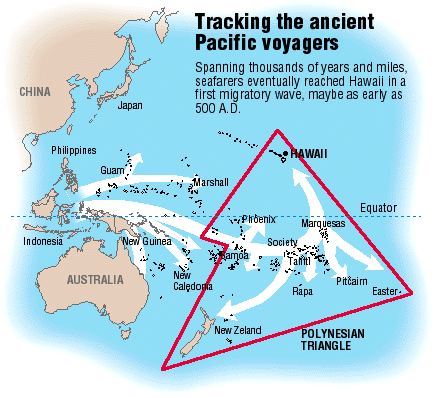

Prehistory to 1780: Ancient Hawaii to
Western Discovery

Voyagers came on
waves and a prayerSouth Polynesian seafarers
By Richard Borreca
settled Hawaiian Isles
in two migrant tides
Star-BulletinThe mystery is when.
We already have a good idea where they came from and how they came -- but when did the ancient voyagers steer their canoes to these islands?
They were not, as archaeologists thought 30 years ago, errant fishermen confused at sea.
They were navigators, royals and likely the strongest, most knowledgeable people in the villages.
Those early journeys ranging from New Zealand to Hawaii and Easter Island were some of mankind's greatest feats, says Herb Kane, historian and artist.
"Within this great triangle of Earth's surface, equal in size to the combined continents of North and South America, almost every island was discovered before European open ocean exploration began," Kane says.
"Their voyaging canoes were the spaceships of the Stone Age."
From Tahiti and the Marquesas Islands southeast of Hawaii, the explorers came.
"How do we account for this nation spreading itself so far over this vast ocean," British Capt. James Cook wrote upon meeting the people of Kauai and remarking that their language was so similar to the peoples' in New Zealand, Easter Island, Tonga and Tahiti.
"The (present-day canoe) Hokule'a has given birth to the feeling that these were great voyagers," says Tom Dye, former state archaeologist. "Early on it was thought that it was fishermen blown off course and drifting."
"It was exploration pure and simple."
Crews "consisted of picked men whose shoulders could bear the strain of the deep sea paddles, trained to endurance and to self-control with regard to food and water," Peter Buck, ethnologist and former Bishop Museum director once told a Kamehameha Schools audience.
When the voyagers, navigating by the stars, finally reached Hawaii, the Big Island's South Point and Upolu Point were likely the first areas settled.
But when did they come?
To answer that, Dye and anthropologist Eric Komori poured over carbon-14 datings from 600 charcoal samples found at various sites. Assuming the samples came from permanent habitations, their research showed the number of cooking fires rising sharply from 900 to 1300 A.D.
Slower growth came in the 15th and 16th centuries, followed by a leveling off after 1600, they report.
As for who first settled Hawaii . . .
"It is not real clear if the cultures of the Marquesas and Tahiti were that much different from each other a thousand years ago," Dye says. "You had a process of one culture settling a number of island groups -- it might be impossible to say which one was the ancestor."
Little remains of those early voyagers, but by the 10th or 11th century, those first Hawaiians were visited by a much tougher crew. A second migrant wave.
Genealogies say it was the warlike chief Nanamaoa who seized control of Hawaii Island, Maui and Oahu.
In his introduction to King David Kalakaua's book, "The Legends and Myths of Hawaii," R.M. Daggett in 1887 wrote that by the 13th century, several other warlike families had established partial or complete sovereignty of the main islands. "It was a season of unusual activity and the legends of the time are filled with stories of love, conquest and perilous voyages to and from the southern islands," Daggett wrote.
The culture was filled with masterful seamen, intelligent observers who had classified and named birds, fish, plants -- even the types of surf and shore breaks. But suddenly, after the 14th century and unlike other Pacific Islands, the Hawaiian culture grew isolated.
Voyages with its Pacific neighbors ended, weakening ties with ancestors to the south. Internally, food production and population boomed. And the island chiefs and high priests grew strong.
Millennium Series Archive